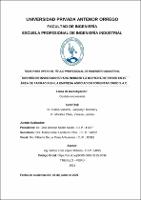| dc.contributor.advisor | Lopez Miñano, Wilton Eder | |
| dc.contributor.author | Colina Valiente, Jacquelyn Rosmery | |
| dc.contributor.author | Morales Chau, Vanesa Luzmila | |
| dc.creator | Colina Valiente, Jacquelyn Rosmery | |
| dc.date.accessioned | 2021-07-05T04:41:30Z | |
| dc.date.available | 2021-07-05T04:41:30Z | |
| dc.date.issued | 2021 | |
| dc.identifier.uri | https://hdl.handle.net/20.500.12759/7750 | |
| dc.description.abstract | La gestión de inventarios para reducir la ruptura de stock es una de las situaciones
que se debe evitar en cualquier empresa, para eludir este punto de ruptura de stock
es necesario mantener una eficiente gestión de inventario y llevar el control de cada
producto en todo momento. En este trabajo de investigación, vamos a hablar de
cómo gestionar el stock de almacén de farmacia para evitar quedarnos sin
productos cuando haya pico de demandas, ya que las dificultades que presenta la
empresa son las constantes rupturas de stock que origina una demanda no
satisfecha del cliente provocado por la falta de stock de un determinado producto.
Nuestro objetivo principal es hacer un sistema de gestión de inventarios para
reducir la ruptura de stock en el área de farmacia utilizando la Técnica de Regresión
Lineal para determinar la metodología con menor error presentado y basado en un
modelo de inventario de los productos farmacéuticos. La propuesta de mejora se
basa en un sistema de gestión de inventarios para reducir la ruptura de stock en el
área de farmacia donde se clasificó el modelo ABC y se subclasificaron los
productos de la categoría “A” a 25 productos usando cuatro métodos: Suavización
Exponencial, Promedio móvil Simple, Promedio móvil ponderado y Regresión lineal;
basados en el modelo EOQ para mejorar la rentabilidad económica para la
empresa. Finalmente, se concluye que al aplicar este modelo EOQ en el año 2019
la rentabilidad económica mejoró un (96%) y se obtuvo un ahorro anual de S/.
6,333.36 soles al disminuir la ruptura de stock, esta mejora se debe a la utilización
del sistema de gestión de inventarios diseñado para la empresa. | es_PE |
| dc.description.abstract | Inventory management to reduce stock breakage is one of the situations that should
be avoided in any company, to avoid this point of stock breakdown it is necessary
to maintain efficient inventory management and always keep track of each product.
In this research work, we are going to talk about how to manage the pharmacy
warehouse stock to avoid running out of products when there is a peak in demand,
since the difficulties presented by the company are the constant stock breaks that
originate an unsatisfied demand from the customer caused by the lack of stock of a
certain product. Our main objective is to make an inventory management system to
reduce the stock break in the pharmacy area using the Linear Regression
Technique to determine the methodology with the lowest error presented and based
on an inventory model of pharmaceutical products. The improvement proposal is
based on an inventory management system to reduce the stock break in the
pharmacy area where the ABC model was classified and the products from category
“A” were sub-classified to 25 products using four methods: Smoothing Exponential,
Simple Moving Average, Weighted Moving Average, and Linear Regression; based
on the EOQ model to improve economic profitability for the company. Finally, it is
concluded that by applying this EOQ model in 2019 the economic profitability
improved by (96%) and an annual saving of S /. 6,333.36 soles by reducing the
stock breakdown, this improvement is due to the use of the inventory management
system designed for the company. | en_US |
| dc.description.uri | Tesis | es_PE |
| dc.format | application/pdf | es_PE |
| dc.language.iso | spa | es_PE |
| dc.publisher | Universidad Privada Antenor Orrego | es_PE |
| dc.relation.ispartofseries | T_ING.IND_136 | |
| dc.rights | info:eu-repo/semantics/openAccess | es_PE |
| dc.rights.uri | https://creativecommons.org/licenses/by/4.0/ | es_PE |
| dc.source | Universidad Privada Antenor Orrego | es_PE |
| dc.source | Repositorio Institucional - UPAO | es_PE |
| dc.subject | Ruptura de stock | es_PE |
| dc.subject | Inventario | es_PE |
| dc.subject | Modelo EOQ | es_PE |
| dc.subject | Regresiones | es_PE |
| dc.title | Gestión de inventarios para reducir la ruptura de stock en el área de farmacia en la empresa Asociación Fomentar ONGD S.A.C. | es_PE |
| dc.type | info:eu-repo/semantics/bachelorThesis | es_PE |
| thesis.degree.level | Título Profesional | es_PE |
| thesis.degree.grantor | Universidad Privada Antenor Orrego. Facultad de Ingeniería | es_PE |
| thesis.degree.name | Ingeniero Industrial | es_PE |
| thesis.degree.discipline | Ingeniería Industrial | es_PE |
| dc.subject.ocde | https://purl.org/pe-repo/ocde/ford#2.11.04 | es_PE |
| renati.advisor.orcid | https://orcid.org/0000-0002-3185-3036 | es_PE |
| renati.author.dni | 42053714 | |
| renati.author.dni | 46958533 | |
| renati.advisor.dni | 17810721 | |
| renati.type | https://purl.org/pe-repo/renati/type#tesis | es_PE |
| renati.level | https://purl.org/pe-repo/renati/level#tituloProfesional | es_PE |
| renati.discipline | 722026 | es_PE |
| renati.juror | Müller Solon, Jose Antonio | |
| renati.juror | Landeras Pilco, María Isabel | |
| renati.juror | De La Rosa Anhuaman, Filiberto | |
| dc.publisher.country | PE | es_PE |


